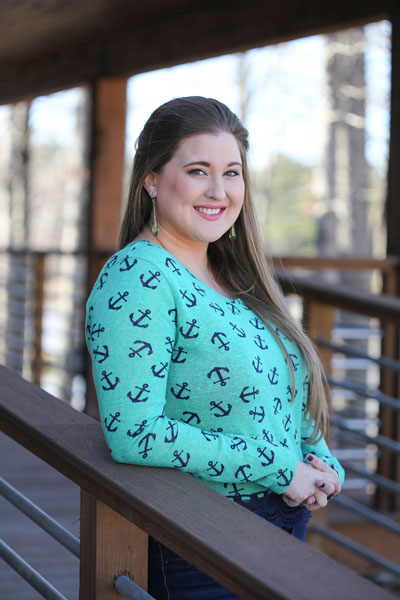In Discharge Planning, Hope is Contagious
Lawrence helps connect treatment to early recovery
The end of your time in treatment is like a fork in the road — a time to take your own first steps down the path of hope and healing you’ve begun.
There at the junction stands Juliette Lawrence, to point the right direction and cheer you on.
“What I love most about my job is sharing people’s excitement about the new life that lies ahead,” said Lawrence, discharge planner at Oxford Treatment Center. “While there’s stress and anxiety around taking the next step after treatment, their excitement and hope for a better future really spills over to all of us.”
As the staff member in charge of coordinating discharge and aftercare for each patient, Lawrence receives recommendations from patients’ primary therapists and meets with patients individually near the conclusion of treatment.
For those who do not continue in Oxford Treatment Center’s Sober Living program, Lawrence’s primary role is identifying another outpatient and/or sober living program that better fits the person’s situation.
“We never let a person discharge without having a good aftercare plan in place,” she said. “Whether that is sober living with IOP (Intensive Outpatient Program), IOP from home, outpatient counseling services, or drug court — it’s critical to have a secure plan for their future.”
“Their hope for a better future really spills over to all of us.”
In nearly all cases, primary therapists recommend that patients transition into a sober living setting for at least 60 days after treatment. That time allows people to practice what they’ve learned in treatment, regaining some independence but still having supervision and support as they begin taking ownership of their recovery.
“Thirty days goes by in the blink of an eye,” Lawrence said. “For most people, you’re just beginning to truly open up and accept your disease toward the end of treatment. That’s why the next steps after treatment are so crucial.”
In individual sessions, primary therapists begin talking with patients about sober living within the first couple of weeks of residential treatment. Studies show a stay in sober living after treatment can double someone’s chances of still being clean at the one-year mark.
It also provides time to reflect upon and internalize what you’ve learned in treatment about the nature of addiction and about yourself.
“Every now and then, someone comes to us from the beginning and says, ‘Teach me. I’m ready to learn,’” Lawrence said. “But most of the time, it takes a while to let your walls down and become vulnerable, and face all the issues you’re dealing with that have caused you to seek drugs and numb the pain.
“You’re very vulnerable at the end of treatment, so when we refer you to another outpatient program, we want to make sure we are sending you to someone who will take care of you like we do.”
Making that connection isn’t always simple. Patients come to Oxford Treatment Center from across the country, and families often prefer a sober living setting closer to home. Patient preference and insurance provisions also play a part.
 Lawrence researches programs and facilities, and also receives recommendations for sober living and outpatient programs through Oxford Treatment Center’s parent company, American Addiction Centers, and its nationwide network of treatment consultants.
Lawrence researches programs and facilities, and also receives recommendations for sober living and outpatient programs through Oxford Treatment Center’s parent company, American Addiction Centers, and its nationwide network of treatment consultants.
“One time in particular, through an AAC consultant, I was able to place a woman into a new, excellent sober living facility that didn’t even have a website yet,” Lawrence said. “The consultants who are on the ground in these locations offer us tremendous insight.”
In the process of managing patients’ transitions, Lawrence sets up phone assessments in which the receiving outpatient program can get to know the patient before they arrive. She also handles transportation arrangements from Oxford Treatment Center.
Along the way, she focuses on keeping the process positive and calming patients’ nerves. Her office is a peaceful, lamp-lit space, with coloring pages, word puzzles and a bowl of candy all within reach.
“Many people are terrified of leaving the security of Oxford Treatment Center,” she said. “When they first get here, they don’t want to be here at all. And towards the end, most of them don’t want to leave. I work hard to put their mind at ease.”
Lawrence invites patients to talk through ideas about what their life will be like in recovery. She asks about the work they’ve done in the past, and about their hobbies, interests and spiritual life.
“We talk about what they like to do outdoors, what they like to do indoors,” she said. “I try to get them imagining what their life can be like outside this bubble.”
“People are terrified of leaving the security of Oxford Treatment Center. I work hard to put their mind at ease.”
Lawrence served as a clinical assistant at Oxford Treatment Center for two years before becoming discharge planner last fall.
She holds a bachelor’s degree in psychology and English from the University of Mississippi, where she was lab coordinator of clinical research in social psychology during her studies. She is working toward a master’s degree in clinical psychology, specializing in personality disorders.
At Oxford Treatment Center, her role also includes handling patient satisfaction surveys — a rewarding task in itself. In the four months since she’s been receiving the surveys, she’s seen only two “maybe” answers when patients are asked if they would recommend Oxford Treatment Center to a friend or loved one. All others answered “yes.”
“Seeing and sharing those responses is a tremendous motivation for me and for all of our staff at Oxford Treatment Center,” she said. “To me, their confidence that we would take care of a friend or loved one is very indicative of the level of care they receive here.”
